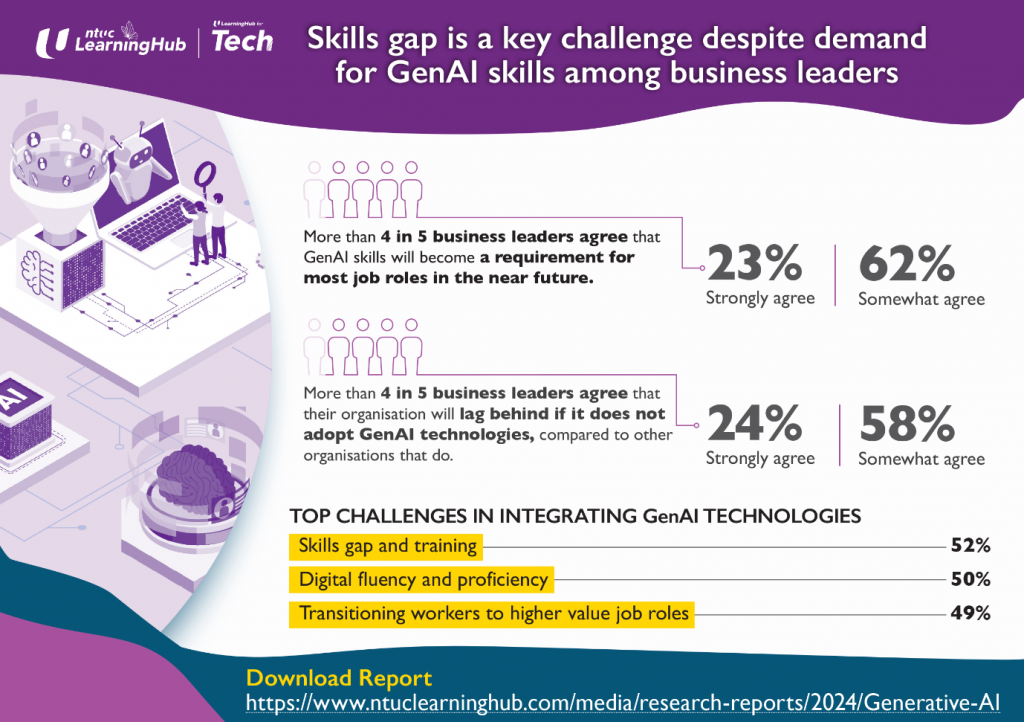
The adoption of Generative Artificial Intelligence (GenAI) technologies is reshaping the workplace, with 87% of business leaders adopting them to certain extent in their daily operations.
Moreover, more than four in five business leaders (23% strongly agree, 62% somewhat agree) corroborate that GenAI skills will become a requirement for most job roles.
Among these skills, data analytics and insights (50%), digital marketing (40%), data modelling (38%), content creation (37%), and computational thinking (35%) emerge as the top GenAI skills coveted by business leaders.
As adoption of GenAI technologies intensifies, about nine in ten business leaders (28% strongly agree, 59% somewhat agree) agree that these technologies will catalyse the creation of new job roles.
Additionally, more than nine in ten business leaders (28% strongly agree, 64% somewhat agree) perceive that GenAI technologies will lead to a re-definition of existing job roles.
Consequently, 62% of business leaders are looking to fill job roles related to GenAI, including qualitative data analysts (23%), content creators (23%), developers (22%), digital marketers (22%), and social media managers (21%).
Amid this trend, more than four in five business leaders (24% strongly agree, 58% somewhat agree) agree that their organisation risks falling behind if it does not adopt GenAI technologies, citing skills gap and training (52%), digital fluency and proficiency (50%), and transitioning workers to higher value job roles (49%) as key challenges they face in integrating GenAI technologies at the workplace.
These are some of the key findings from NTUC LearningHub’s Industry Insights Report 2024 on Generative AI which investigates the role of GenAI and its impact on the workforce.
Based on a survey of 200 business leaders from diverse industries and interviews with an industry expert, the report examines the sentiments towards hiring, training, and in-demand skills.
Motivated by the possibility of enhancing productivity and efficiency (54%), nurturing a future-ready workforce to thrive in a future with GenAI (47%), and driving business growth (46%), 86% of business leaders are keen to send their employees for training on GenAI.
Other top motivators include the desire to foster a culture of learning and innovation (44%) and adapt to industry trends (40%).
In particular, business leaders express interest in training their employees in the areas of data analysis and insights (35%), data modelling (30%), digital marketing and advertising (27%), content creation (25%), and strategic planning and decision making (25%).
While almost all business leaders (98%) consider GenAI skills transferable across different job roles and industries, they also deem digital fluency (41%), creative thinking (36%), system thinking (35%), design thinking (34%), and problem-solving (32%) as essential critical core skills needed to support employees in the GenAI-enabled future of work.
Commenting on the report’s findings, Mr Amos Tan, Chief Core Skills Officer, NTUC LearningHub, said: “The widespread adoption of GenAI has profound impact on the workplace, underscoring the need for new job roles and the redesign of existing ones. To ensure that both employers and employees remain competitive and equipped for a GenAI-empowered workplace, it is paramount that employers cultivate a future-ready workforce.
“This involves establishing a conducive learning environment with accessible training opportunities and fostering transparent conversations on the pressing need to acquire GenAI skills. While nurturing employees’ GenAI competencies is essential, employers must prioritise the development of critical core skills alongside diverse thinking skills like creative, system and design thinking.
“Through holistic skills set, employees can effectively harness the power of GenAI technologies to perform their work and achieve their organisations’ desired business outcomes. Therefore, GenAI will not replace humans, but augment and amplify human strengths.”












